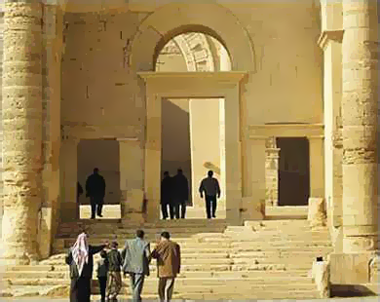It is the third largest Iraqi city after Baghdad and Basra (about 400,000 people), located in northern Iraq on the Tigris river, the center of Nineveh governorate and one of the most important Iraqi cities commercially and industrially, celebrated for its Muslin industry, a type of clothes made of silk, there are other industries like the production of sugar and sulfur industry, Mosul comprises the most important Iraq oil fields, and has the renown Ain Zala refineries, adjacent to it the old historic Nineveh city ruins.
It includes a civilian airport, active trade movement by being on the broad railway connecting Baghdad with the northern Syrian cities: Qamishli, Deir
Ezzor, and Aleppo, and characterized also by its healthy air and water freshness, on a whole it is hot in summer, and cold in winter.
Mosul is an ancient city considered one day as the gate of Iraq and key of Khorasan, from which Azerbaijan is bound for, the old saying states "the great countries of the world are three: Nishapur (orient door), Damascus (west door) and Mosul because travelers heading for any of the said two places would hardly not pass through Mosul.
It was named Mosul because it connected between the Peninsula and Iraq, and it was said that because it connects between the Tigris and the Euphrates, and it was also told that the name of the king who built it was Mosul, Rawnd bin Pewarsif, and the first who leveled the streets of Mosul in the Arab-Islamic era, and built also a wall around it, was Marwan bin Mohammad bin Marwan bin Al Hakam.
One of the prominent features of Mosul today is the minaret of Al Nouri Mosque known as "Al Hadba", the most celebrated landmarks of the city and one of the oldest minarets in the Islamic world, and the old wall of Nineveh which has been re-built comprising: Qlei'at, a remnant of the Assyrian Nineveh city, Bab Al Sarai, Al Sarj Khana, Souk Al Sagheer and Dar Al Tutanji which has been restored again as one of the oldest Mosul houses. And the conical-shaped domes of Prophet Joseph mosque, the winged angel: wise man and doctor of Assyria, which dates back thousands of years, temple of the sun goddess where the Assyrian columns and statues are rising, and the relics or Nimrud southwest of Mosul, as it was the capital of the Assyrian Empire II
Source: Casablanca foundation

